Conflicts
Overview
Teaching: 20 min
Exercises: 0 minQuestions
What do I do when my changes conflict with someone else’s?
Objectives
Identify what conflicts are and when they can occur.
Resolve conflicts resulting from a merge.

As soon as people can work in parallel, someone is going to step on someone else’s toes.
This will even happen with a single person: if we are working on a piece of software on both our laptop and a server in the lab, we could make different changes to each copy.
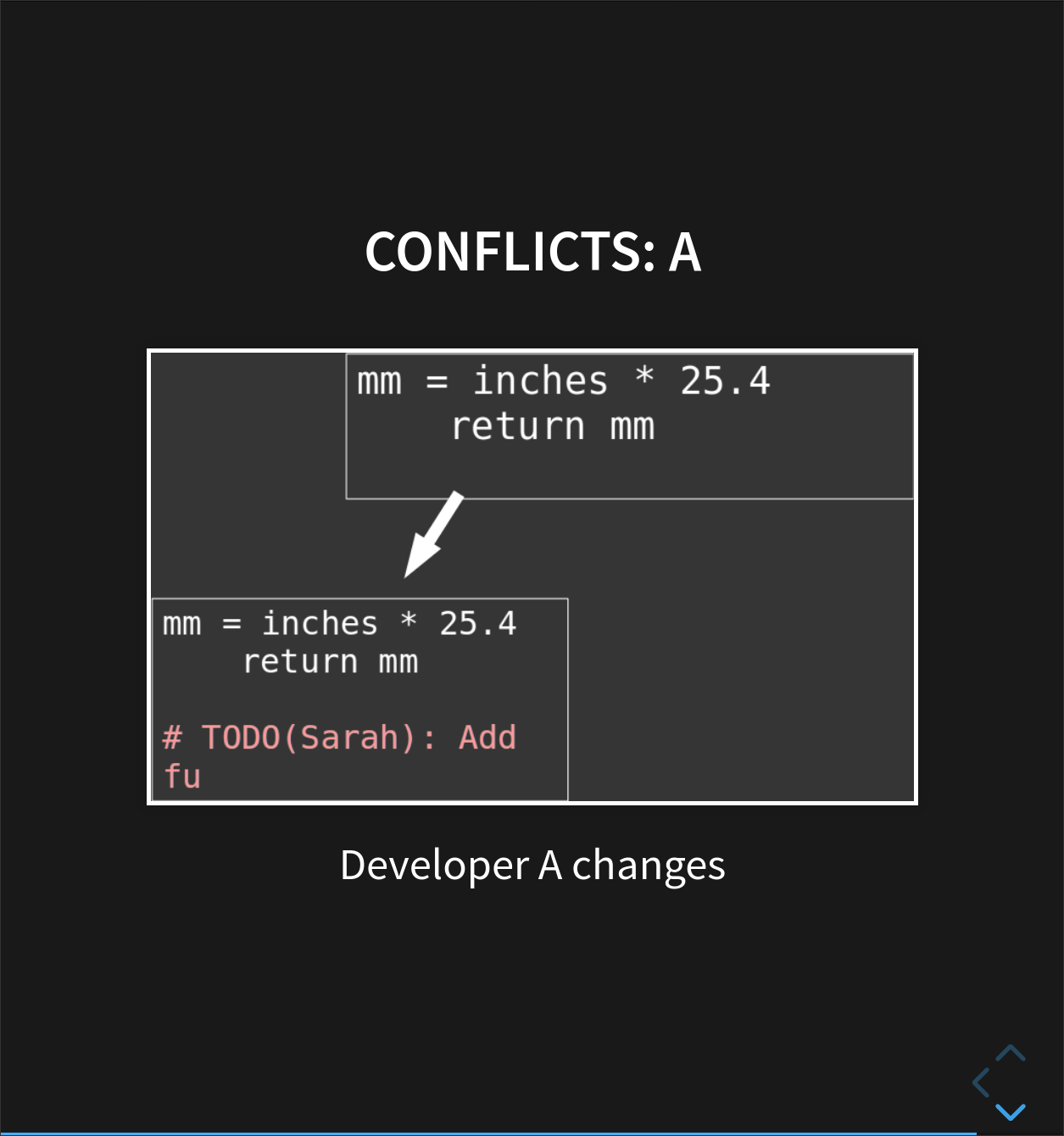
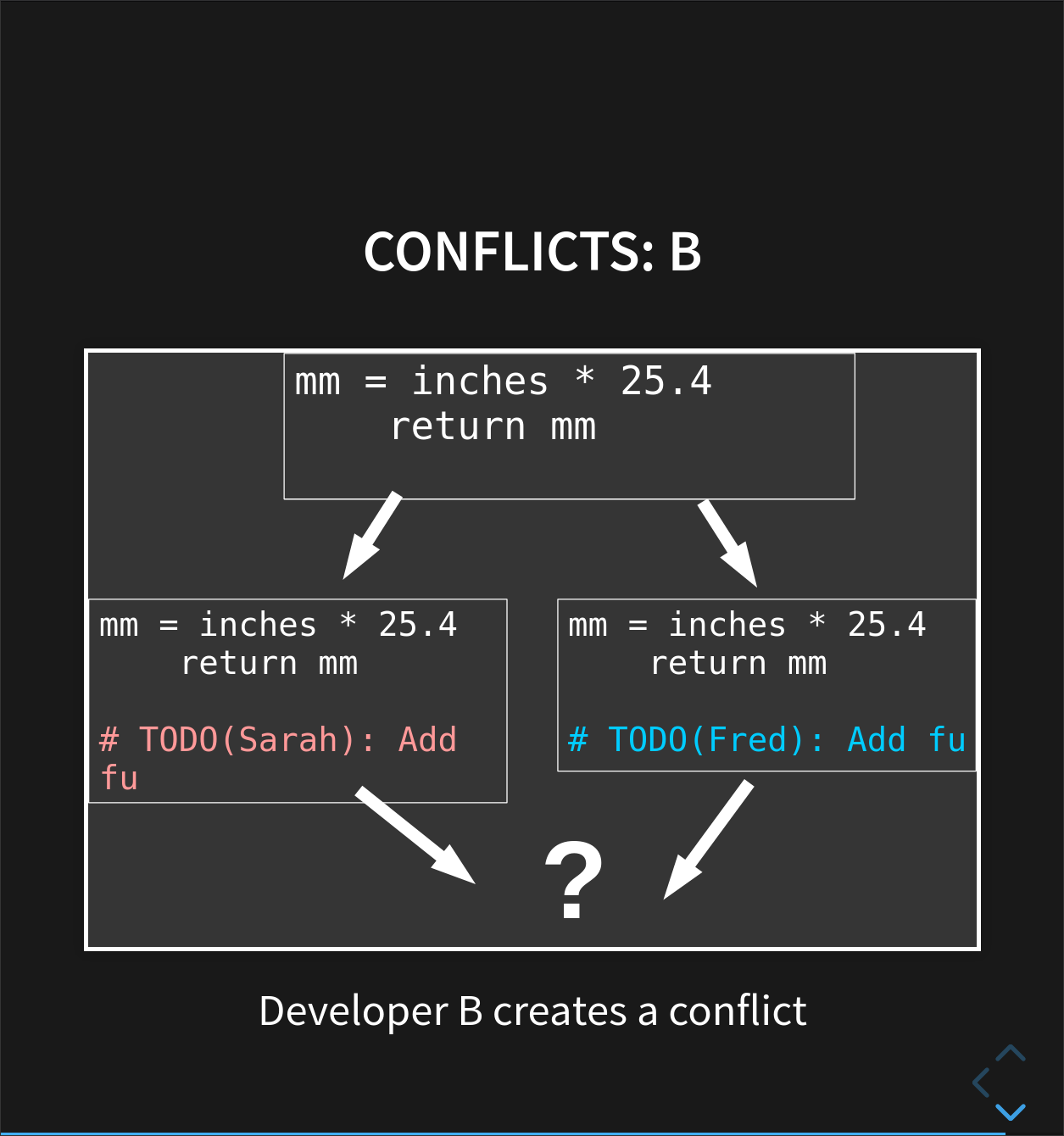
These situations are called conflicts Version control helps us manage these conflicts by giving us tools to resolve overlapping changes.
To see how we can resolve conflicts,
we must first create one.
The file rainfall_conversion.py currently looks like this
on the dev branch of our climate-analysis repository:
$ cat rainfall_conversion.py
"""A library to perform rainfall unit conversions"""
def inches_to_mm(inches):
"""Convert inches to milimetres.
Arguments:
inches -- the rainfall inches
"""
mm = inches * 25.4
return mm
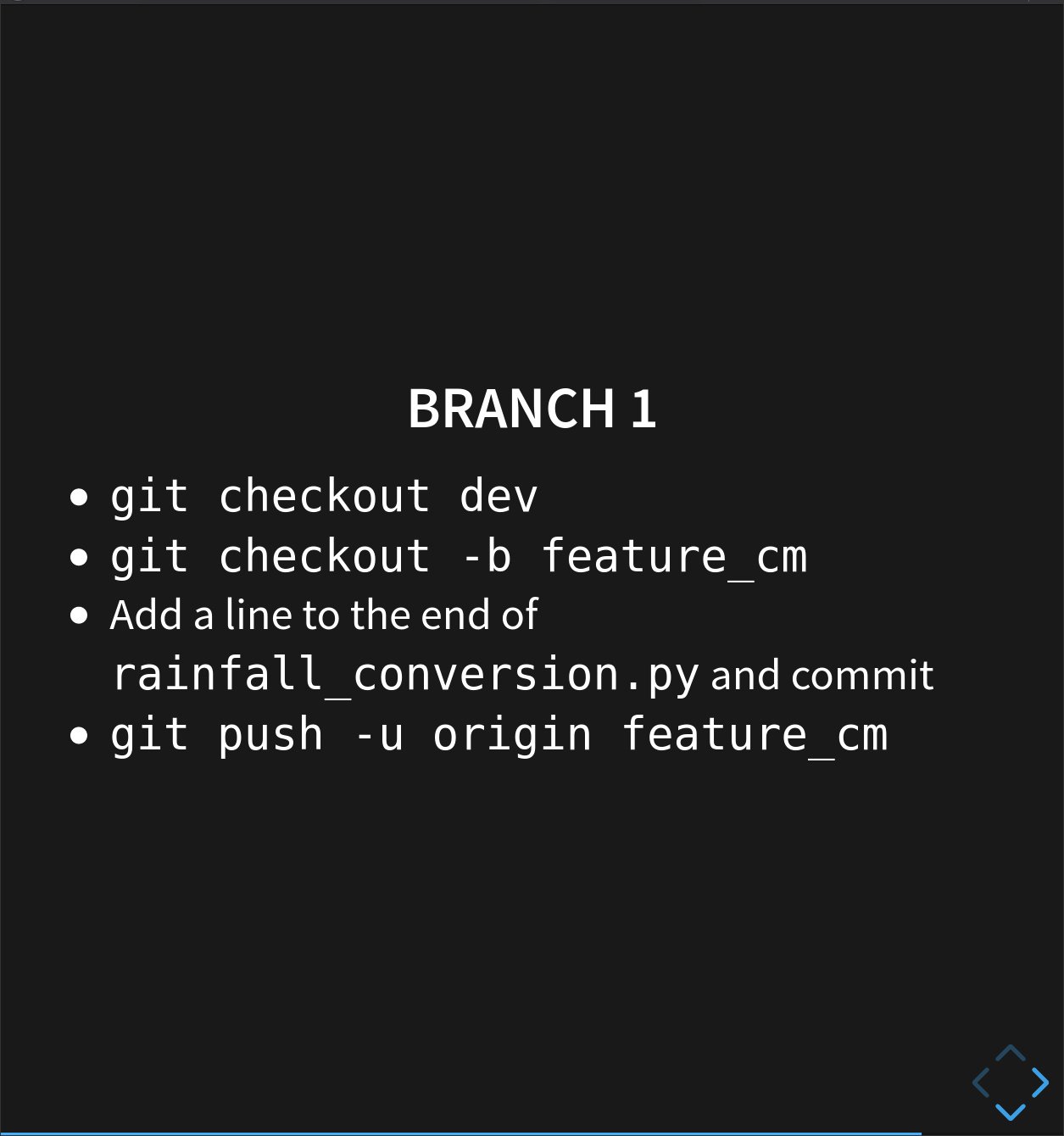
Feature branch 1
Let’s say we want to add a new function to convert from inches to centimeters. We’ll create a new branch, feature_cm, and add a placeholder there.
First we’ll make sure we’re branching out from our development branch, then we can create and switch to a new branch using one command- git checkout -b:
$ git checkout dev
Switched to branch 'dev'
$ git checkout -b feature_cm
Switched to a new branch 'feature_cm'
Now, let’s add a small placeholder to the end of our rainfall file:
$ nano rainfall_conversion.py
$ cat rainfall_conversion.py
"""A library to perform rainfall unit conversions"""
def inches_to_mm(inches):
"""Convert inches to milimetres.
Arguments:
inches -- the rainfall inches
"""
mm = inches * 25.4
return mm
# TODO: Add function inches_to_cm
and then push the change to GitHub:
$ git add rainfall_conversion.py
$ git commit -m "Added cm placeholder"
[feature_cm 6288bd3] Added cm placeholder
1 file changed, 2 insertions(+)
Now we’ll push the feature branch up to GitHub. If we add the -u flag, then we set a default ‘upstream’ for that branch. After this, when we want to push any changes on this branch, we can just use git push- we don’t have to specify where we’re pushing to!
$ git push -u origin feature_cm
Enumerating objects: 5, done.
Counting objects: 100% (5/5), done.
Delta compression using up to 12 threads
Compressing objects: 100% (3/3), done.
Writing objects: 100% (3/3), 323 bytes | 323.00 KiB/s, done.
Total 3 (delta 2), reused 0 (delta 0)
remote: Resolving deltas: 100% (2/2), completed with 2 local objects.
remote:
remote: Create a pull request for 'feature_cm' on GitHub by visiting:
remote: https://github.com/smangham/climate-analysis/pull/new/feature_cm
remote:
To github.com:smangham/climate-analysis.git
* [new branch] feature_cm -> feature_cm
Branch 'feature_cm' set up to track remote branch 'feature_cm' from 'origin'.
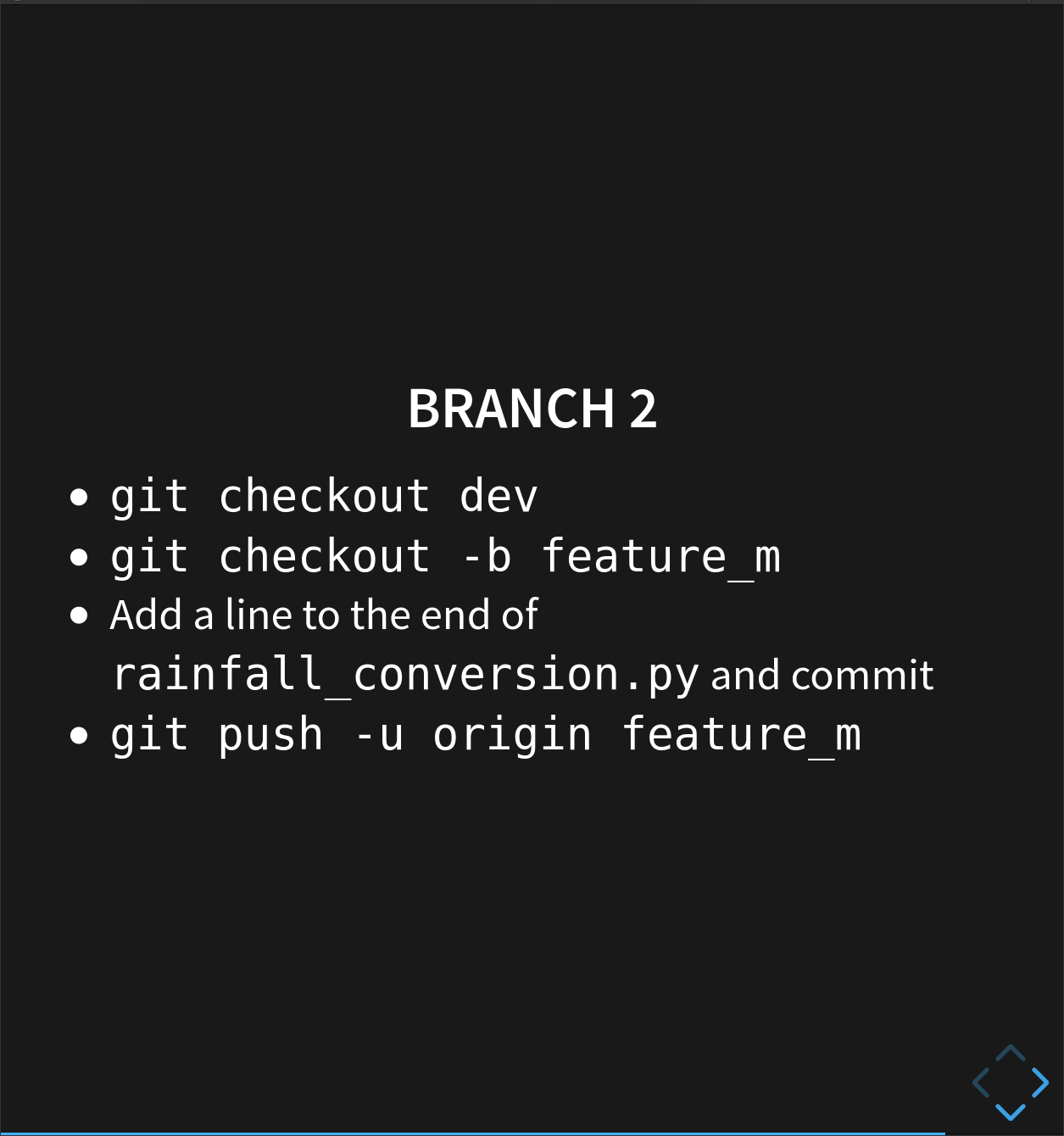
Feature branch 2
Now, we’re going to introduce a conflict. Let’s switch back to dev, and create another branch. We also want a function that converts inches to meters. So we go back to dev, and create a new branch.
$ git checkout dev
Switched to branch 'dev'
$ git checkout -b feature_m
Switched to a new branch 'feature_m'
We’re going to add another placeholder:
$ nano rainfall_conversion.py
$ cat rainfall_conversion.py
"""A library to perform rainfall unit conversions"""
def inches_to_mm(inches):
"""Convert inches to milimetres.
Arguments:
inches -- the rainfall inches
"""
mm = inches * 25.4
return mm
# TODO: Add function inches_to_m
And again we commit and push the changes:
$ git add rainfall_conversion.py
$ git commit -m "Added m placeholder"
[feature_m 2bc1789] Added m placeholder
1 file changed, 2 insertions(+)
$ git push -u origin feature_m
Enumerating objects: 5, done.
Counting objects: 100% (5/5), done.
Delta compression using up to 12 threads
Compressing objects: 100% (3/3), done.
Writing objects: 100% (3/3), 322 bytes | 322.00 KiB/s, done.
Total 3 (delta 2), reused 0 (delta 0)
remote: Resolving deltas: 100% (2/2), completed with 2 local objects.
remote:
remote: Create a pull request for 'feature_m' on GitHub by visiting:
remote: https://github.com/smangham/climate-analysis/pull/new/feature_m
remote:
To github.com:smangham/climate-analysis.git
* [new branch] feature_m -> feature_m
Branch 'feature_m' set up to track remote branch 'feature_m' from 'origin'.
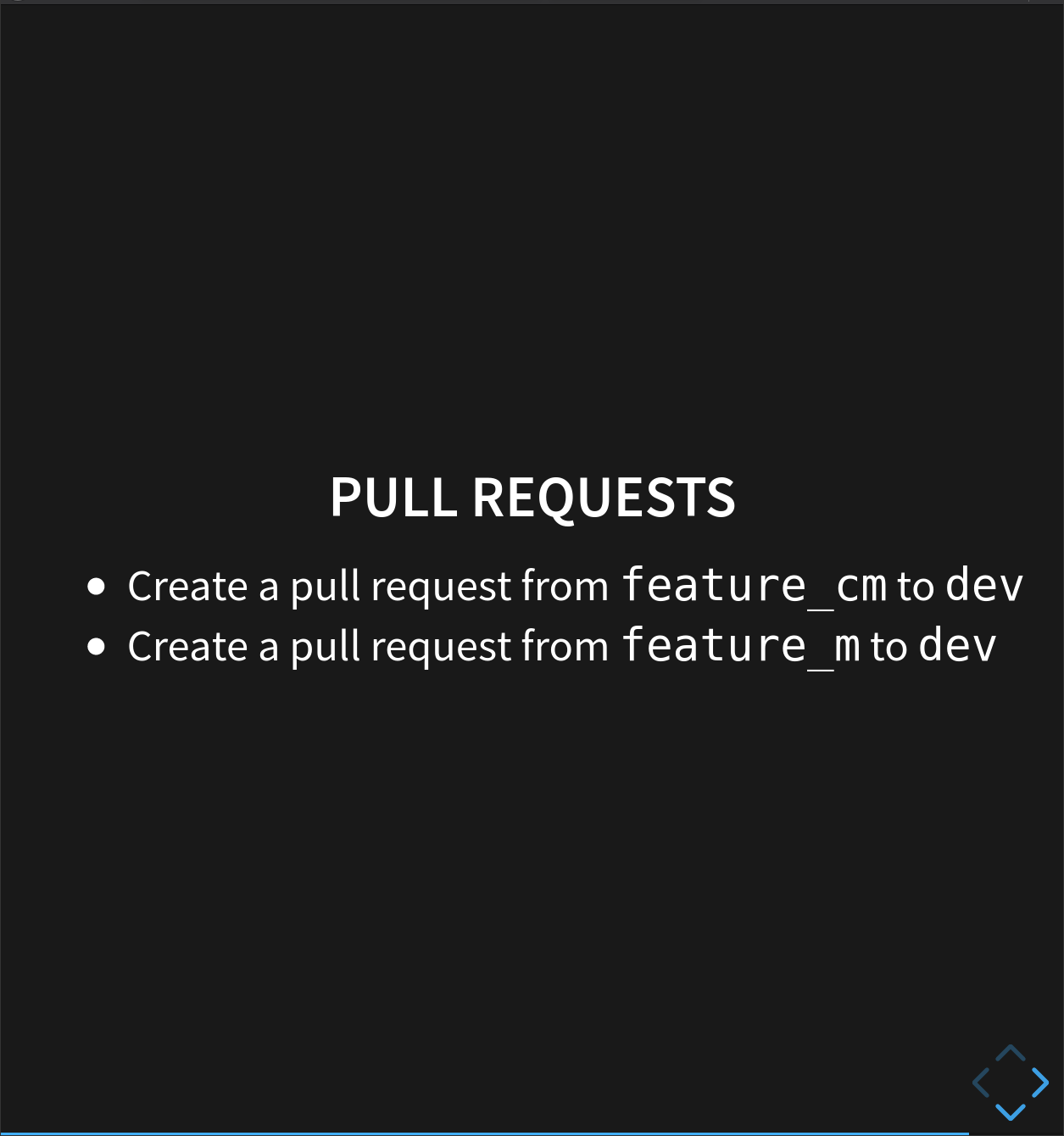
Pull requests and conflicts
We’ve now created both our placeholders, so let’s merge them into our dev branch. First, we go onto GitHub and create a pull request for feature_cm to dev- this should go fine!
Secondly, we try and create one for feature_m to dev. This time, we should see something new:

We can’t automatically merge these branches! Let’s create the pull request anyway. It will show us which files are conflicting:
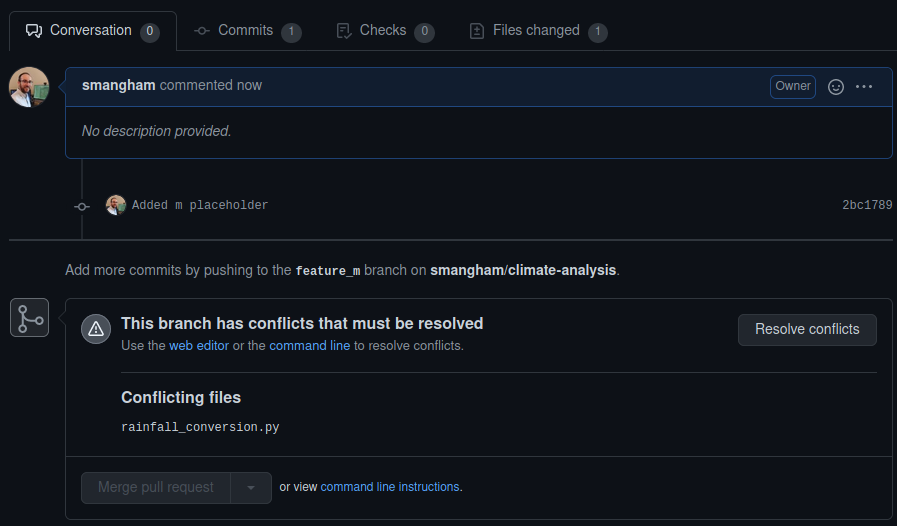
If you click Resolve conflicts, GitHub offers a nice interface to show which files are modified, and how they clash (GitLab also offers this functionality!). In our case, you can see both branches have edited the last line of the same file.
A ======= splits the two sets of changes, and each side lets you know which branch the changes belong to. You can resolve the conflict here, but we’re going to do it on the command line. Some conflicts can be too large or complicated to resolve through a web interface, so it’s important to understand how to do it locally.
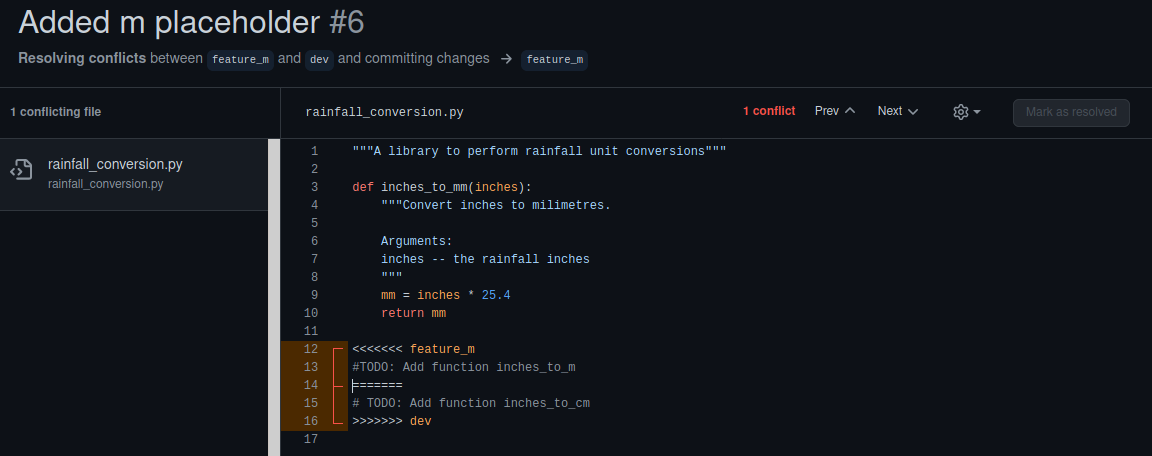
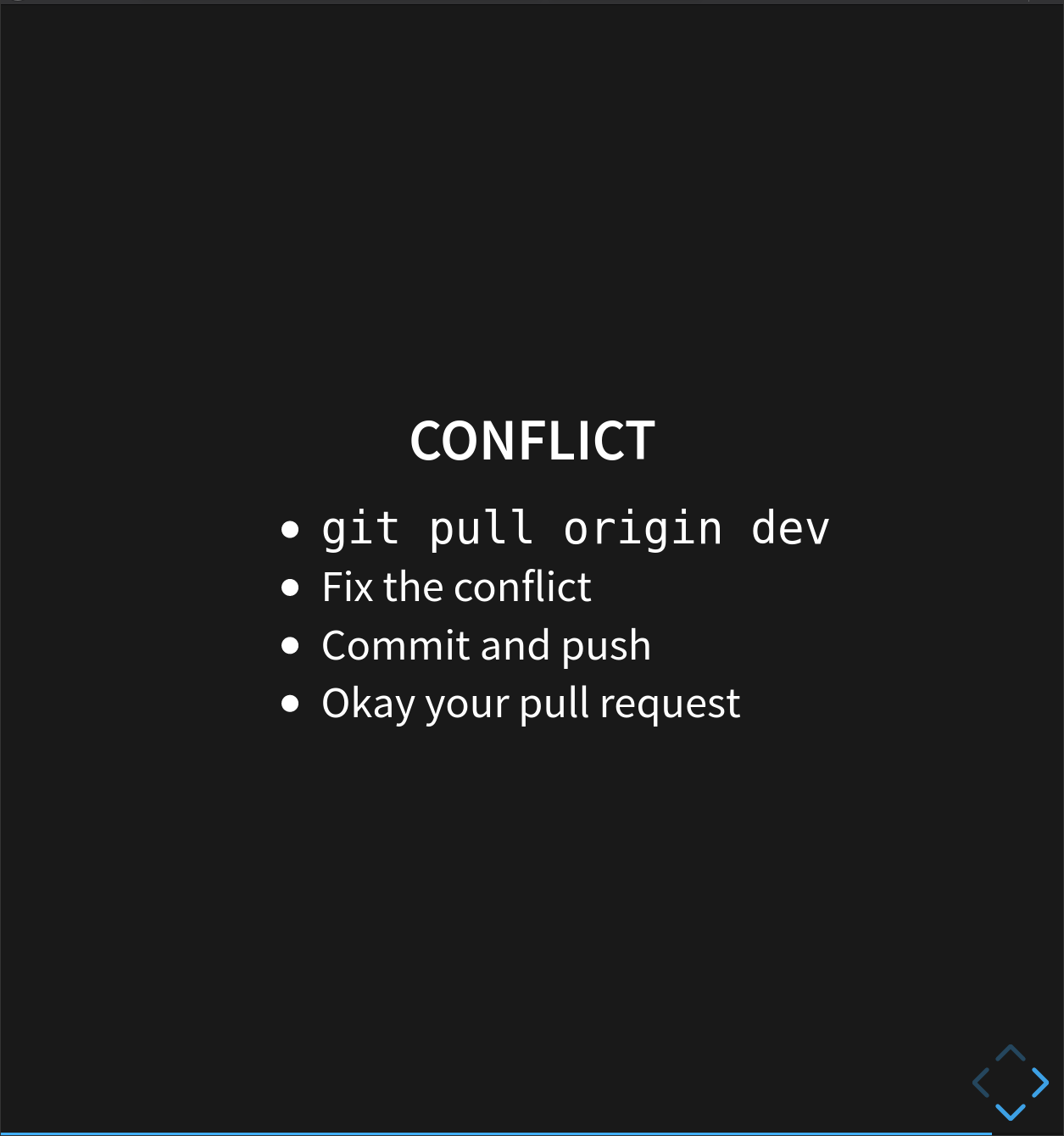
Resolving conflicts
Conflicts happen when one branch contains commits that another branch doesn’t. So in order to merge our feature_m branch in, we need to get it up to date with dev.
We can do this by pulling the commits from dev into our current branch (feature_m).
$ git pull origin dev
remote: Enumerating objects: 1, done.
remote: Counting objects: 100% (1/1), done.
remote: Total 1 (delta 0), reused 0 (delta 0), pack-reused 0
Unpacking objects: 100% (1/1), 631 bytes | 631.00 KiB/s, done.
From github.com:smangham/climate-analysis
* branch dev -> FETCH_HEAD
311e67e..35fd1b5 dev -> origin/dev
Auto-merging rainfall_conversion.py
CONFLICT (content): Merge conflict in rainfall_conversion.py
Automatic merge failed; fix conflicts and then commit the result.
As we can see, this gives us a conflict, and it’s one that we can fix. If we look inside the rainfall_conversion.py file, we’ll see the same problems we saw on GitHub, though this time the labels will be slightly different. Instead of labelling branches, they label specific commits, where HEAD means the latest commit on this branch and the other one will be the ID of the latest commit on the dev branch:
$ cat rainfall_conversion.py
"""A library to perform rainfall unit conversions"""
def inches_to_mm(inches):
"""Convert inches to milimetres.
Arguments:
inches -- the rainfall inches
"""
mm = inches * 25.4
return mm
<<<<<<< HEAD
#TODO: Add function inches_to_m
=======
# TODO: Add function inches_to_cm
>>>>>>> 35fd1b5cb0223d9e63b539854ba7317ac6ede614
In this case, we don’t want to select only one change or the other- we want to keep both placeholders. So let’s edit the file to remove the conflict markers:
$ nano rainfall_conversion.py
$ cat rainfall_conversion.py
"""A library to perform rainfall unit conversions"""
def inches_to_mm(inches):
"""Convert inches to milimetres.
Arguments:
inches -- the rainfall inches
"""
mm = inches * 25.4
return mm
# TODO: Add function inches_to_m
# TODO: Add function inches_to_cm
We can add our fix, then commit and push it up to our remote repository:
$ git add rainfall_conversion.py
$ git commit -m "Fixed the conflict in rainfall module"
[feature_m 7e1c7a6] Fixed the conflict in rainfall module
$ git push
Enumerating objects: 7, done.
Counting objects: 100% (7/7), done.
Delta compression using up to 12 threads
Compressing objects: 100% (3/3), done.
Writing objects: 100% (3/3), 333 bytes | 333.00 KiB/s, done.
Total 3 (delta 2), reused 0 (delta 0)
remote: Resolving deltas: 100% (2/2), completed with 2 local objects.
To github.com:smangham/climate-analysis.git
2bc1789..7e1c7a6 feature_m -> feature_m
Remember, because we used git push -u earlier we didn’t have to specify where we were pushing to. Now let’s go back to GitHub, and look at the pull request there (you may need to refresh the page):
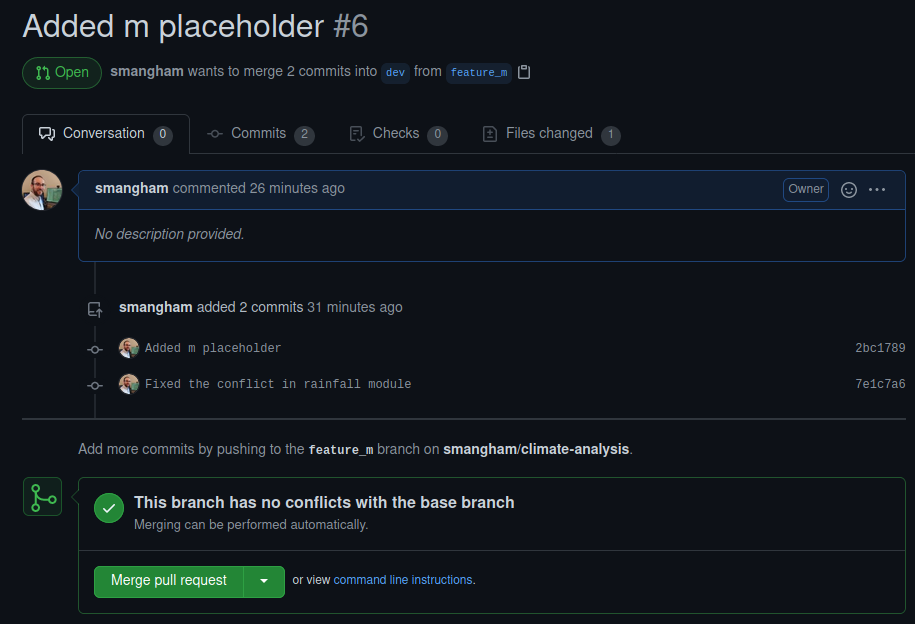
We can see the new commit we added that fixes the problem, and now the commits can be merged. Our conflict is sorted.
If you want, you can always merge branches directly into dev, without going through a pull request, but this isn’t a great habit to get into. If the conflict is large, complicated, or otherwise takes a long time to resolve, you won’t be able to merge in any other branches until you’ve finished. This can mean essential bug fixes end up waiting for you to finish adding new bells and whistles!
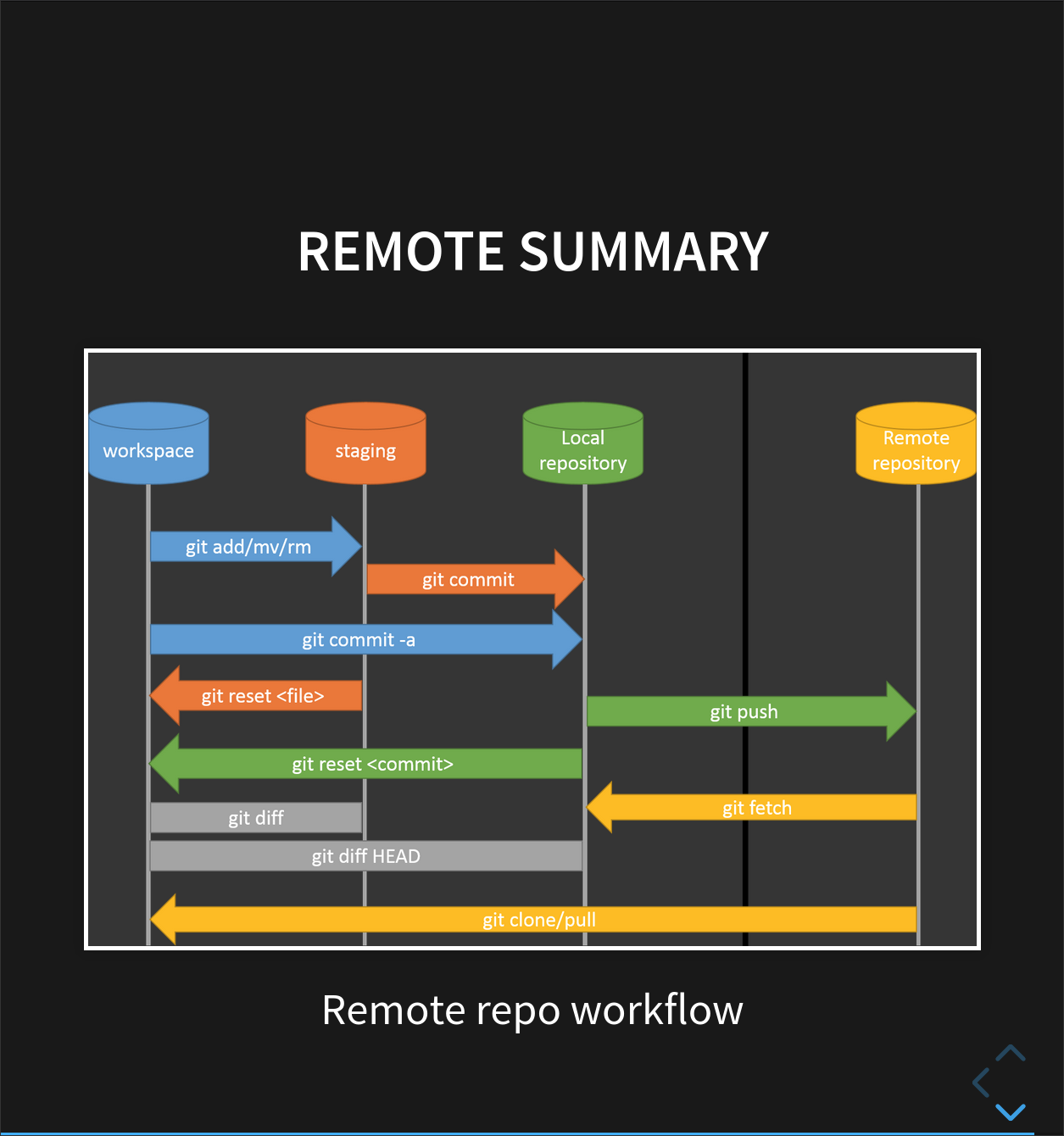
Version control’s ability to merge conflicting changes is another reason users tend to divide their programs and papers into multiple files instead of storing everything in one large file. There’s another benefit too: whenever there are repeated conflicts in a particular file, the version control system is essentially trying to tell its users that they ought to clarify who’s responsible for what, or find a way to divide the work up differently.
Conflicts on Non-textual files
What does Git do when there is a conflict in an image or some other non-textual file that is stored in version control?
Key Points
Conflicts occur when different commits change the same lines of the same file.
The version control system does not allow changes to overwrite each other, but highlights conflicts so that they can be resolved.
git checkout -bcreates a new branch and checks it out at the same time.
git push -ulinks a local branch with an ‘upstream’ branch on a remote repository.
git pullcan pull changes from one branch into another locally.